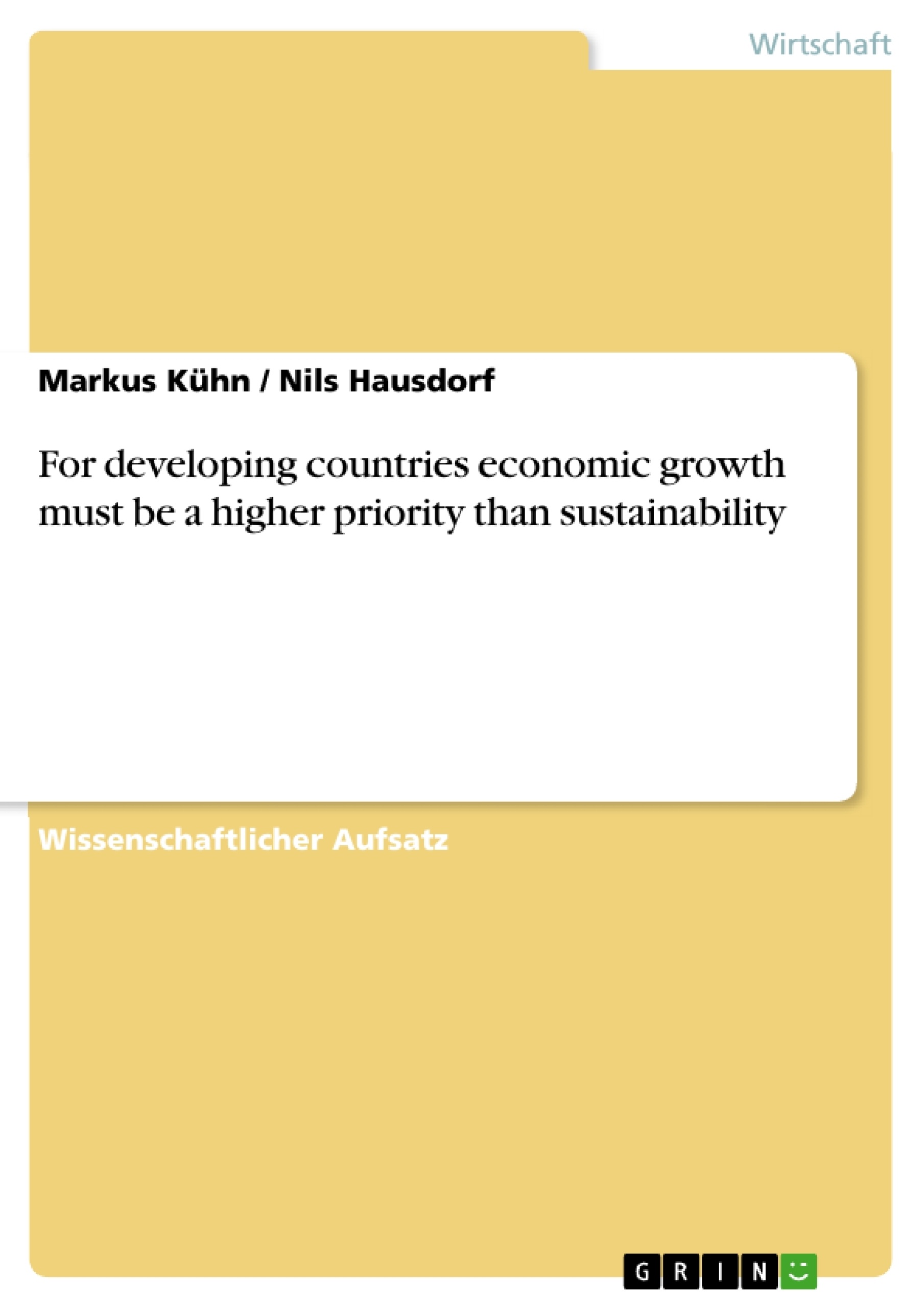Developing countries face serious threats in various fields nowadays. Many attempt to keep up with globalization, however, often at the expense of their environment and people. This work aims to point out the importance of sustainable policies especially in developing countries and the opportunities arising from a new way of thinking, eventually attempting to prove that sustainability and economic growth are no options to be chosen in neglectance of the other.
Inhaltsverzeichnis
- Introduction
- Economic Growth Versus Sustainable Development
- The Role of Technology
- Governmental Responsibility
- Human Development
- Fiscal Financial and Market Policy
- Conclusion
- Literaturverzeichnis
Zielsetzung und Themenschwerpunkte
Der vorliegende Beitrag befasst sich mit der Frage, ob für Entwicklungsländer das Wirtschaftswachstum eine höhere Priorität haben muss als die Nachhaltigkeit. Die Arbeit argumentiert, dass Nachhaltigkeit für Entwicklungsländer wichtiger ist als Wirtschaftswachstum. Die Arbeit untersucht die Interdependenzen zwischen Wirtschaftswachstum und den verschiedenen Dimensionen der nachhaltigen Entwicklung, insbesondere im Hinblick auf Technologie, Umwelt, soziale Entwicklung und Regierungspolitik.
- Die Bedeutung von Technologie für nachhaltige Entwicklung in Entwicklungsländern
- Die Rolle der Regierung bei der Förderung nachhaltiger Entwicklung
- Der Zusammenhang zwischen Wirtschaftswachstum und menschlicher Entwicklung
- Die Auswirkungen von Wirtschaftswachstum auf die Umwelt
- Die Bedeutung von Finanz- und Marktpolitik für nachhaltiges Wirtschaftswachstum
Zusammenfassung der Kapitel
Die Einleitung stellt die Fragestellung und die Definitionen der Schlüsselbegriffe dar. Es wird argumentiert, dass nachhaltige Entwicklung nicht als nachhaltiges Wachstum verstanden werden kann, sondern als ein umfassender Ansatz, der ökologische, soziale, wirtschaftliche und technologische Aspekte integriert.
Das Kapitel "Economic Growth Versus Sustainable Development" untersucht die Beziehung zwischen Wirtschaftswachstum und Nachhaltigkeit. Es wird argumentiert, dass Wirtschaftswachstum allein nicht ausreicht, um Armut zu reduzieren, und dass nachhaltige Entwicklung entscheidend ist, um die Lebensqualität der Menschen zu verbessern.
Das Kapitel "The Role of Technology" konzentriert sich auf die Bedeutung von Energietechnologie für die nachhaltige Entwicklung in Entwicklungsländern. Es wird argumentiert, dass Investitionen in erneuerbare Energien (RET) entscheidend sind, um Armut zu reduzieren, Arbeitsplätze zu schaffen und die Umwelt zu schützen.
Das Kapitel "Governmental Responsibility" untersucht die Rolle der Regierung bei der Förderung nachhaltiger Entwicklung. Es wird argumentiert, dass politische und soziale Stabilität, die Bekämpfung von Korruption und die Förderung von Bildung entscheidend sind, um nachhaltiges Wirtschaftswachstum zu ermöglichen.
Das Kapitel "Human Development" untersucht den Zusammenhang zwischen Wirtschaftswachstum und menschlicher Entwicklung. Es wird argumentiert, dass Investitionen in Bildung, insbesondere in die Bildung von Frauen, entscheidend sind, um die Lebensqualität der Menschen zu verbessern und das Bevölkerungswachstum zu kontrollieren.
Das Kapitel "Fiscal Financial and Market Policy" untersucht die Bedeutung von Finanz- und Marktpolitik für nachhaltiges Wirtschaftswachstum. Es wird argumentiert, dass eine hohe fiskalische Verantwortung, Investitionen in Bildung und Technologie sowie eine marktorientierte Politik entscheidend sind, um nachhaltiges Wirtschaftswachstum zu fördern.
Schlüsselwörter
Die Schlüsselwörter und Schwerpunktthemen des Textes umfassen nachhaltige Entwicklung, Wirtschaftswachstum, Entwicklungsländer, Technologie, Energie, Umwelt, soziale Entwicklung, Regierungspolitik, Bildung, Armut, Bevölkerungswachstum, Finanzpolitik, Marktpolitik.
Häufig gestellte Fragen
Muss Wirtschaftswachstum für Entwicklungsländer Vorrang vor Nachhaltigkeit haben?
Die Arbeit argumentiert gegen diese Priorisierung und zeigt auf, dass nachhaltige Politik gerade für Entwicklungsländer essenziell ist, um langfristig Armut zu reduzieren.
Welche Rolle spielt Technologie für die nachhaltige Entwicklung?
Investitionen in erneuerbare Energietechnologien (RET) sind entscheidend, um Arbeitsplätze zu schaffen, die Umwelt zu schützen und gleichzeitig die Energieversorgung zu sichern.
Wie hängen Bildung und nachhaltiges Wachstum zusammen?
Investitionen in die menschliche Entwicklung, insbesondere in die Bildung von Frauen, sind Schlüsselfaktoren zur Kontrolle des Bevölkerungswachstums und zur Steigerung der Lebensqualität.
Welche staatliche Verantwortung besteht in Entwicklungsländern?
Regierungen müssen für politische Stabilität sorgen, Korruption bekämpfen und eine marktorientierte Finanzpolitik fördern, um nachhaltiges Wachstum zu ermöglichen.
Können Wirtschaftswachstum und Nachhaltigkeit Hand in Hand gehen?
Ja, die Arbeit versucht zu belegen, dass Nachhaltigkeit und Wirtschaftswachstum keine gegensätzlichen Optionen sind, sondern sich gegenseitig bedingen.
Was sind die größten ökologischen Bedrohungen für Entwicklungsländer?
Oft wird Wirtschaftswachstum auf Kosten der Umwelt und der Gesundheit der Bevölkerung vorangetrieben, was langfristig die Lebensgrundlagen zerstört.
- Quote paper
- Markus Kühn (Author), Nils Hausdorf (Author), 2009, For developing countries economic growth must be a higher priority than sustainability, Munich, GRIN Verlag, https://www.grin.com/document/146958



